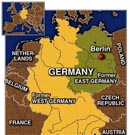For Germans, unification fails to live up to expectations
 Berlin - With the 20th anniversary of the fall of the Berlin Wall approaching, many Germans are disappointed with the achievements made since unification, according to a new poll.
Berlin - With the 20th anniversary of the fall of the Berlin Wall approaching, many Germans are disappointed with the achievements made since unification, according to a new poll.
The survey by the opinion research organization Forsa showed less than half of those polled thought their personal situation had improved since the fusion of East and West Germany.
"The euphoria that dominated after the fall of the Wall has more or less disappeared," the head of Forsa, Professor Manfred Guellner, told the newspaper Berliner Zeitung.
A majority in both east and west said they were disappointed by the developments in the two decades since the Wall came down in November 1989. Unification followed
11 months later, in October 1990.
Back in 1989 some 71 per cent of Germans in the communist east believed life would get better. Today the figure is 46 per cent. In the west, only 40 per cent think things have improved against 52 per cent who believed they would at the time the Wall fell.
One in four East Germans thinks life is worse now than it was under communism and only 39 per cent believe they have personally profited from unification, according to the survey of 1,008 Germans conducted between December 10-16, 2008.
Guellner said prejudices on both sides of the once divided country had hardened over the years.
Whereas Germans in the east think they were exploited and given a raw deal, "the westerns have the feeling they have had to foot the bill for the east."
There is still a lot to do before the former East Germany could be compared with what was once West Germany, according to Transport Minister Wolfgang Tiefensee.
Unemployment in the east is double that in the west and average wages are only 73 per cent of those in the west, said Tiefensee, a former mayor of the eastern city of Leipzig.
"We have to change that if we want to avoid the exodus of skilled workers," the minister said, pointing out that 34,000 young east Germans leave each year to seek their fortunes in the west.
Wolfgang Boehmer, premier of the eastern State of Saxony Anhalt, believes that nearly 20 years after unification there are still psychological differences between east and west.
This has manifested itself in pejorative terms like Ossis and Wessis, used to refer to those from the other side. But Boehmer believes such differences have been overestimated.
Boehmer said he hoped people would maintain a realistic picture of the country whose leaders built the Berlin Wall, and let go of a somewhat "glorified" memory that has taken hold.
He was referring to the nostalgia that still crops up for some aspects of life in East Germany, demonstrated in films such as Good Bye Lenin! and the cult car, the Trabant.
Boehmer said the 2009 anniversary was a chance to present a realistic picture of what life was really like in a police state without basic freedoms.
"We have to visualize that it was a basic desire of the people in East Germany to live differently to the way they actually lived," he said. (dpa)